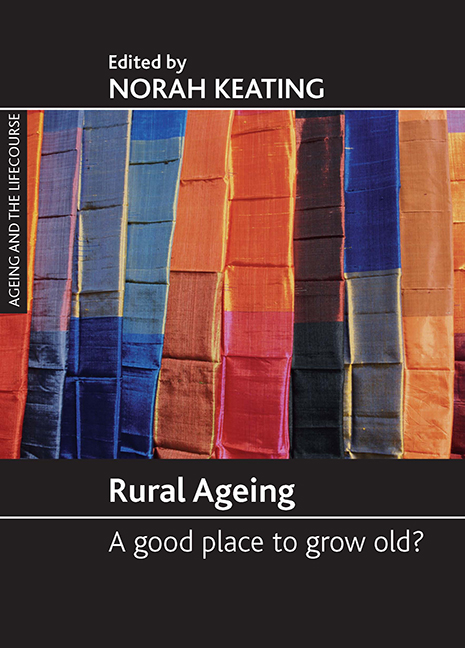Book contents
- Frontmatter
- Contents
- Foreword
- Acknowledgements
- Notes on contributors
- one A critical human ecology perspective on rural ageing
- two Crossing borders: lifecourse, rural ageing and disability
- three Rurality and ageing well: ‘a long time here’
- four The evolution of networks of rural older adults
- five Distance, privacy and independence: rural homecare
- six Respite for rural and remote caregivers
- seven Ageing, disability and participation
- eight Participation in rural contexts: community matters
- nine Staying connected: issues of mobility of older rural adults
- ten Ageing and social exclusion in rural communities
- eleven Age-friendly rural communities
- twelve Revisiting rural ageing
- References
- Index
- Other titles in the Ageing and the Lifecourse series
three - Rurality and ageing well: ‘a long time here’
Published online by Cambridge University Press: 19 January 2022
- Frontmatter
- Contents
- Foreword
- Acknowledgements
- Notes on contributors
- one A critical human ecology perspective on rural ageing
- two Crossing borders: lifecourse, rural ageing and disability
- three Rurality and ageing well: ‘a long time here’
- four The evolution of networks of rural older adults
- five Distance, privacy and independence: rural homecare
- six Respite for rural and remote caregivers
- seven Ageing, disability and participation
- eight Participation in rural contexts: community matters
- nine Staying connected: issues of mobility of older rural adults
- ten Ageing and social exclusion in rural communities
- eleven Age-friendly rural communities
- twelve Revisiting rural ageing
- References
- Index
- Other titles in the Ageing and the Lifecourse series
Summary
Introduction
Throughout our lives the places in which we live reflect aspects of self. And, we reflect those places. In this chapter, we focus on rural place as a human ecological context and consider the impact for older women of choosing to age in such rural landscapes, contrasting the rolling countryside of England with the apparently harsher landscape of the Canadian West. Building on Rowles’ (1983a, 1983b) concept of ‘attachment to place’ and working from a lifecourse perspective, we consider how the physicality of natural landscapes, in connection with social ideas about ‘rural’, may contribute to lifelong identities. We focus our critical lens on rural women who have been less visible than men in their relationships with the land, yet are core to Western beliefs in rural as a place of close kin and community (Little and Austin, 1996) and thus a good place to grow old. Referring to two qualitative studies in rural Canada and semi-rural England, we consider how women continue to find meaning as kin and community keepers in these places and how the choice to live there is part of their ageing well.
In Western society, due to increasing longevity, the concept of ‘ageing well’ is gaining renewed interest. One way to conceptualise ageing well is in terms of an ongoing process in which individuals make sense of their ageing amid later-life change (Chapman, 2005). Part of this process requires people to make decisions about how to live based on what is available in their communities. For example, what health and transport systems are available locally? What opportunities exist for socialising and for social support? Might individuals have to move to access key amenities, family and friends? As a result, do people perceive options (Peace et al, 2006) and/or feel constrained by the very places to which they have been long attached (Rowles, 1983b; Rowles and Watkins, 2003)? Such attachment is complex with potential changes across the lifecourse impacting personal affect, cognition and behaviour (Zingmark et al, 1995). Some older people may find themselves having to move from communities and places to which they are attached (Rowles, 1983b) and such change may influence how they make sense of who they are and of how they are ageing.
In this chapter, we explore the interdependence of older women with the rural landscapes in which they live.
- Type
- Chapter
- Information
- Rural AgeingA Good Place to Grow Old?, pp. 21 - 32Publisher: Bristol University PressPrint publication year: 2008
- 3
- Cited by



